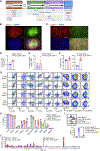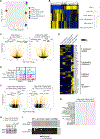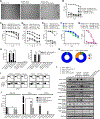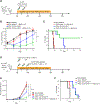3D-organoid culture supports differentiation of human CAR+ iPSCs into highly functional CAR T cells
- PMID: 35278370
- PMCID: PMC9119152
- DOI: 10.1016/j.stem.2022.02.009
3D-organoid culture supports differentiation of human CAR+ iPSCs into highly functional CAR T cells
Erratum in
-
3D-organoid culture supports differentiation of human CAR+ iPSCs into highly functional CAR T cells.Cell Stem Cell. 2022 Apr 7;29(4):651-653. doi: 10.1016/j.stem.2022.03.007. Cell Stem Cell. 2022. PMID: 35395190 No abstract available.
Abstract
Unlimited generation of chimeric antigen receptor (CAR) T cells from human-induced pluripotent stem cells (iPSCs) is an attractive approach for "off-the-shelf" CAR T cell immunotherapy. Approaches to efficiently differentiate iPSCs into canonical αβ T cell lineages, while maintaining CAR expression and functionality, however, have been challenging. We report that iPSCs reprogramed from CD62L+ naive and memory T cells followed by CD19-CAR engineering and 3D-organoid system differentiation confers products with conventional CD8αβ-positive CAR T cell characteristics. Expanded iPSC CD19-CAR T cells showed comparable antigen-specific activation, degranulation, cytotoxicity, and cytokine secretion compared with conventional CD19-CAR T cells and maintained homogeneous expression of the TCR derived from the initial clone. iPSC CD19-CAR T cells also mediated potent antitumor activity in vivo, prolonging survival of mice with CD19+ human tumor xenografts. Our study establishes feasible methodologies to generate highly functional CAR T cells from iPSCs to support the development of "off-the-shelf" manufacturing strategies.
Keywords: 3D-organoid culture; CAR; PSC-ATO; chimeric antigen receptor T cells; human iPSC; immunotherapy; off-the-shelf; pluripotent stem cell-artificial thymic organoid culture.
Copyright © 2022 Elsevier Inc. All rights reserved.
Conflict of interest statement
Declaration of interests C.E.B., S.J.F., and Z.W. are listed on patent(s) relating to this work: Forman, S.J., Brown, C.E., and Wang, Z. Generation of chimeric antigen receptor modified T cells from stem cells and therapeutic uses thereof. U.S. application n. 62/931125. PCT application no. PCT/US2020/059216. A.M.H., C.S.S., and G.M.C. are co-founders of Pluto Immunotherapeutics, which holds certain rights over intellectual property relating to the ATO system.
Figures





Comment in
-
Successful organoid-mediated generation of iPSC-derived CAR-T cells.Cell Stem Cell. 2022 Apr 7;29(4):493-495. doi: 10.1016/j.stem.2022.03.005. Cell Stem Cell. 2022. PMID: 35395182
References
-
- Akbar AN, and Henson SM (2011). Are senescence and exhaustion intertwined or unrelated processes that compromise immunity? Nature reviews Immunology 11, 289–295. - PubMed
-
- Black J, and Vos JM (2002). Establishment of an oriP/EBNA1-based episomal vector transcribing human genomic beta-globin in cultured murine fibroblasts. Gene Ther 9, 1447–1454. - PubMed
-
- Brentjens RJ, Riviere I, Park JH, Davila ML, Wang X, Stefanski J, Taylor C, Yeh R, Bartido S, BorquezOjeda O, et al. (2011). Safety and persistence of adoptively transferred autologous CD19-targeted T cells in patients with relapsed or chemotherapy refractory B-cell leukemias. Blood 118, 4817–4828. - PMC - PubMed
Publication types
MeSH terms
Substances
Grants and funding
LinkOut - more resources
Full Text Sources
Other Literature Sources

